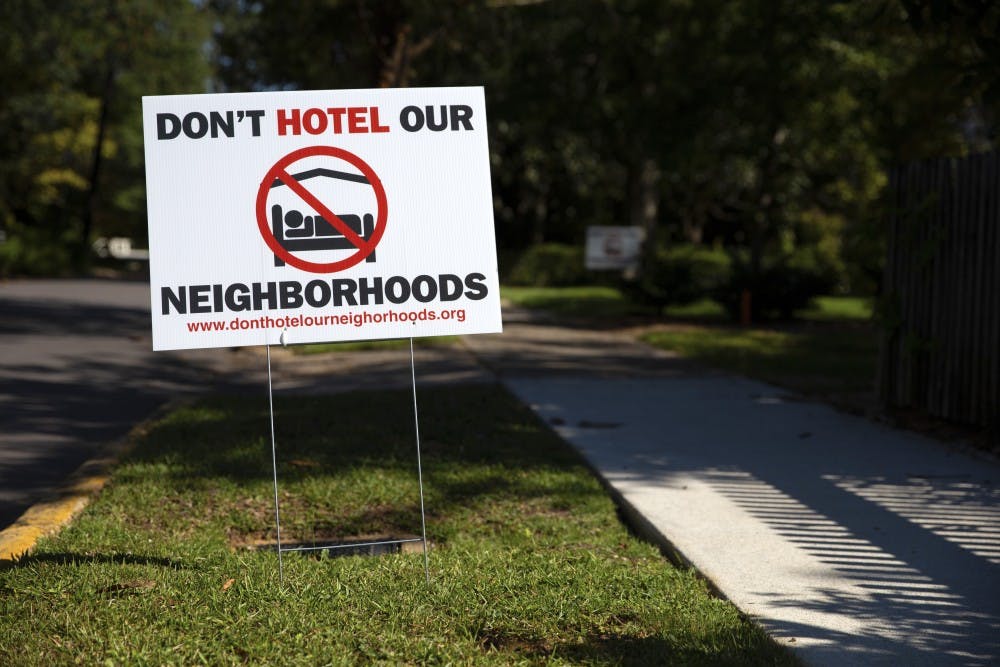After extensive community expression and debate during Monday’s specially called meeting, the City of Auburn’s Planning Commission approved the motion of the short-term rental ordinance to carry on to the City Council for review on February 16. The ordinance allows for short-term rentals in zones which permit the housing of up to five unrelated occupants.
Short-term rentals began to grow in popularity in Auburn in about 2013. VRBO, Airbnb and other vacation rental websites facilitate the use of these rentals. The City defines a short-term rental as a house that is rented fewer than 180 days per year.
Many Auburn residents rent out their homes, particularly during football season, as a way to allow people from out of town to enjoy Auburn and earn themselves a small income.
Although benefiting some, single-family homeowners have brought complaints to the City about trash, noise and parking issues caused by tenants of short-term rentals. Signs saying “Don’t hotel our neighborhoods” have popped up all across Auburn’s neighborhoods and petitions have been signed in protest of short-term rentals in recent years.
Acting Planning Director Katherine Robison described how the City began to solve this issue by establishing that short-term rentals could be prohibited in certain zones and renters must pay extra occupancy taxes, but the City had issues with enforcement.
In 2018, a Short-term Rental Task Force was created, consisting of individuals from the Planning Commission, City Council and community members. Over multiple work sessions and public hearings, the STR Task Force, Planning Commission and City Council revised and proposed a draft to solve the issue of short-term rentals.
All of these factors led to the Jan. 25 public hearing with the Planning Commission. The proposal now moves to the City Council on Feb. 16.
The two types of short-term rentals recognized by the City are homestays and short-term non-primary rentals. A homestay is the owner’s primary dwelling, or any part of it, which is hired out for lodging. Short-term non-primary rentals do not have to be a primary residence, but can only be leased by the owner to another party for 30 consecutive days or less.
The amendments included in the proposed ordinance grant permission for short-term rentals within zones which permit the housing of up to five unrelated occupants. This does not include single family zones, Auburn University property or industrial zones. The proposal also includes consequences for non-compliance.
Neighborhood conservation zones are restricted in the ordinance from engaging in either type of short-term rental. Rural zones are permitted to engage in short-term rental activity.
When the virtual public hearing was opened by Commission member Phillip Chansler, many individuals spoke up. Community members mostly spoke about the inclusion of certain zones in the list of permitted short-term rental zones.
“I want to know who my neighbors are,” said Bill Casky, resident of a neighborhood conservation zone. “I do not want itinerant renters passing through the house next door in what is supposed to be a family neighborhood. Protect the residential and family neighborhoods from the negatives of trash, noise, parking issues and safety for kids because you don’t know who the people are. Those people knew when they moved into these neighborhoods that it was against the rules.”
Some members of the community were in fact so against the recommendations of the ordinance that they brought up issues of the City’s past in their moment to be heard.
“I would like to remind you that just a few years ago, the City of Auburn, along with the Creekwood Development and Ashton Park, were in court for two years pertaining to these exact issues,” said Donna Goodlet representative of the Creekwood Development Homeowner’s Association. “I do not think that any of us want to repeat that again.”
Goodlet urged the City to prohibit short-term rentals in rural zones, claiming it is directly at odds with their covenant.
“The people that don’t want Airbnb’s in their neighborhoods fear neighborhood degradation or that their neighborhood is being ‘hotel-ed out,’ but I think for short-term rentals, people take more pride in their property and it will stay a nicer property. It’s a lower risk I feel rather than being stuck with a neighbor who has leased there for a year who is not a good leaser,” said community member Josh Poole. “I think a fair compromise is to keep it for your private residents and ban it from developers.”
Others did not have arguments to ban short-term rentals but still shared their opinion and experience before the Commission.
“I have a lovely home, I bought it to visit my family and to potentially retire there,” said community member Carolyn Smith. “I want the planning commission to please consider the NC exclusion. I do not want to lose my home. I count on that supplementary income to help make my payments. I love Auburn and I’d love to be able to stay here.”
Some community members made the argument that not all rented properties attract undesirable tenants.
“It’s counterproductive to allow your guests to disturb your neighbors, its counterproductive to rent to people who would destroy property, and its counterproductive to not vet your guests thoroughly for your safety and your neighbors’,” said community member Jamie Anderson.
There is also a third party of people who stepped up seeking a compromise that might appease both sides of the issue.
“There is a happy medium or compromise [to] allow people that have the space and the opportunity and have the gift of hospitality who want to extend their home and invite people into the community,” said community member David Ficken. “I would like to see some accommodation rather than a blanket statement that says, ‘you can’t have it.’”
Chanslor presented the Commission with the opportunity to address questions proposed by the public. Clarification between the two types of short-term rentals was requested. The only difference between the two is that a homeowner must be present for at least 120 days for a homestay but can rent to a six-guest maximum for 360 days per year. STNP rental has no limitation on guests but they are only limited to 240 days of rentals. The zones are the same. One requires a zoning certificate and the other requires a homeowner present. The enforcement would be the same.
The planning commission stated that they do not enforce restrictions for neighborhoods. This is true even if they are within the rights of the zoning ordinance, since they might be outside of their HOA. This could also apply to ‘split zone’ neighborhoods which would then default to the most restrictive form of residential occupancy covenants.
Community members also inquired about violation consequence enforcements. The commission explained that if the City Council were to adopt something, there will be a short period before enacting consequences. If the ordinance gets passed, then there will be opportunities to revisit and discuss the ordinances as the public desires.
An issue repeatedly raised by members of the community is the split between being for or against short-term rentals in Neighborhood Conservation zones which are listed in the ordinance as places where short-term rentals are prohibited.
Commission member Warren McCord weighed in on the issue of including NC neighborhoods into the permitted short-term rental zones.
“The single-family neighborhoods were not developed arbitrarily,” McCord said. “It was obvious that our citizens wanted zones where they can be protected from and where you can mitigate the commercial activity and multiunit development. That is where Neighborhood Conservation came into play. We have concluded that NC areas are for families. But, the whole idea is that if we allow the short-term rentals in the single family-neighborhoods, then we are violating the definition of the single-family neighborhood.”
It was suggested by Commission member Marcus Marshall that the limited number of overnight guests and need for the presence of the primary resident in a homestay is irrelevant with the new changes made to the ordinance.
Other Commission members echoed the notion that limiting the number of guests allowed for homestay rentals is not regulated in any other sense when occupancy has still been determined so therefore should not have a limit.
McCord motioned for the ordinance as advertised to be recommended the City Council for approval. Robert Ritenbaugh seconded.
Chansler proposed the motion to remove the definition of Transient Occupancy from the ordinance. The Commission members unanimously agreed and the amendment carried.
Marcus Marshall proposed an amendment to the regulations on home occupations, removing the paragraph limiting the homestay guests to six. Although McCord rejected the motion, all other members accepted and it was amended. The second amendment was unanimously approved.
The motion to amend paragraph E to change the term ‘zoning certificate’ to ‘home occupation license’ was also proposed and unanimously agreed to. An amendment to remove the zoning destination of SCCD was unanimously agreed to as well.
Bridges and Reese voted no on the newly amended motion while all other members voted yes. The Planning Commission ruled that the newly amended motion will be sent to the City Council for final approval.
Do you like this story? The Plainsman doesn't accept money from tuition or student fees, and we don't charge a subscription fee. But you can donate to support The Plainsman.





